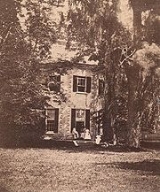
Bellevue Mansion
Encyclopedia
Bellevue Mansion was a historic country house located between N. Marston and N. Etting Streets, off Allegheny Avenue, in North Philadelphia section of Philadelphia, Pennsylvania
, in the United States
.
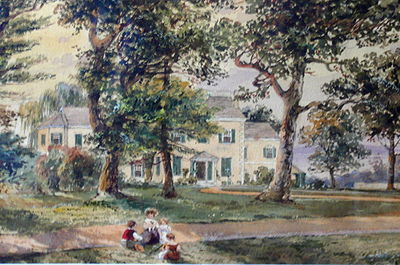
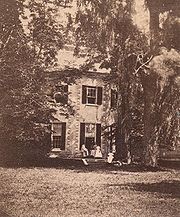
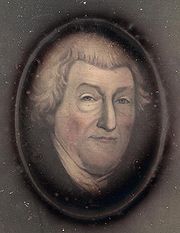 Bellevue was purchased from Thomas Ketland and his wife Elizabeth as a country estate in 1802 by Philadelphia merchant Charles Wharton (1743–1838), grandfather of industrialist Joseph Wharton
Bellevue was purchased from Thomas Ketland and his wife Elizabeth as a country estate in 1802 by Philadelphia merchant Charles Wharton (1743–1838), grandfather of industrialist Joseph Wharton
. It was located about 3 miles (4.8 km) northwest of Philadelphia, just below the heights of Germantown
.
 Bellevue remained in the Wharton family for more than 60 years. In 1834 Charles Wharton gave the estate to his son William (1790–1856), who resided there in the summer with his wife Deborah Fisher Wharton
Bellevue remained in the Wharton family for more than 60 years. In 1834 Charles Wharton gave the estate to his son William (1790–1856), who resided there in the summer with his wife Deborah Fisher Wharton
for two decades raising their family. It was a working farm of 106 acre (0.42896716 km²), situated in rolling hills, with house, barn, sheds, vegetable gardens, orchard
s, field
s, and farm animals. The manor house
overlooked a small valley and brook that flowed into the Schuylkill River
. Large willows, sycamores
, and oaks
dominated the house and landscape
. Servants, mostly Irish
, assisted with housekeeping and hired hands worked the fields and maintained the farm animals. The estate was surrounded by woods and estates of other wealthy Philadelphians.
 Bellevue Mansion was large and roomy, constructed in stone, with two stories
Bellevue Mansion was large and roomy, constructed in stone, with two stories
, basement
, and widow's walk
on the roof. Originally constructed by an Englishman
who enjoyed dancing, it contained a large ballroom
, used by the Wharton family as a game room. The family visited Bellevue often, entertaining many guests young and old. Paralleling the creek nearby was Nicetown Lane, leading about a half mile down to the Schuylkill River
.
William and Deborah were heavily involved in religious affairs of their Quaker Meeting
and in the period 1825 to 1840 depended on Bellevue with its housemistress to keep their children occupied during the summer months. Joseph Wharton and his brother Charles and their siblings often walked down Nicetown Lane to the Schuylkill River, where they cooled off during the summer.
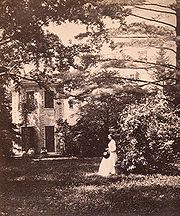
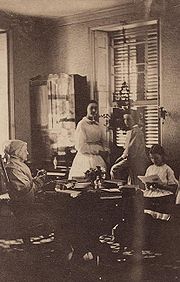
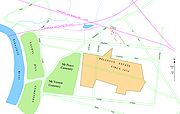 Starting in the 1840s, Bellevue was threatened by local development. In 1839, the Reading Railroad built its main line from Philadelphia
Starting in the 1840s, Bellevue was threatened by local development. In 1839, the Reading Railroad built its main line from Philadelphia
to Norristown and north to Reading. The line ran about 30 yards (27.4 m) from the mansion on the north. The surrounding land, between
Germantown
and the city limits of Philadelphia, today's North Philadelphia, was relatively undeveloped, and in the period 1850 to 1880 entrepreneur
s bought up many of the old estates for industrial sites and housing developments. To the younger generation of that time, the railroads represented progress, allowing anyone to travel quickly and boosting the economy of the region. This was especially true for Joseph Wharton and his siblings, who accepted such worldly improvements, and became immersed in the industrial economy. The trains were convenient, with a "Bellevue" station within a short walk of the mansion. But they also carried huge loads of coal, thundering by the house at inconvenient times, and the constant noise was annoying for guests staying at Bellevue. Although still a beautiful estate, its utility as a respite from city life would be limited.
In 1854, Philadelphia expanded its borders
to include the surrounding suburbs, and after the Civil War
its population swelled to several hundred thousand. By 1870 the Centennial Exposition
was upcoming, and Philadelphia was rapidly changing. It was suffering from a water crisis because it required more water, but there was no appropriate method for water purification and the Delaware
and Schuylkill
rivers were heavily polluted. Philadelphia's typhoid fever
rate was among the highest in the nation, and most well-to-do families drank bottled spring water.

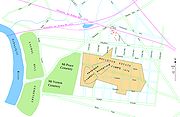 Although Bellevue had been threatened since the 1840s by the proximity of the nearby railroads, it was now threatened more directly. In the 1870s the entire Bellevue estate, then owned by Joseph Wharton and his siblings, along with several other estates nearby that had been annexed into the city, was threatened with condemnation by the city for the construction of the proposed Cambria Reservoir to hold potable water. The Wharton siblings were angry and frustrated that there seemed no recourse when the city chose their estate on which to build.
Although Bellevue had been threatened since the 1840s by the proximity of the nearby railroads, it was now threatened more directly. In the 1870s the entire Bellevue estate, then owned by Joseph Wharton and his siblings, along with several other estates nearby that had been annexed into the city, was threatened with condemnation by the city for the construction of the proposed Cambria Reservoir to hold potable water. The Wharton siblings were angry and frustrated that there seemed no recourse when the city chose their estate on which to build.
Joseph Wharton saw a potential solution to the water problems. He started purchasing land in southern New Jersey
in the 1870s, eventually acquiring 150 square miles (388.5 km²) in the Pinelands
, which contained an aquifer
replenished by several rivers and lakes. The water from the Pinelands was relatively pure and he planned to export the water to Philadelphia. Wharton suggested that a city-controlled company could develop the necessary water mains and pump
s, funded by public purchase of stocks and bonds. There was opposition to the plan by others in Philadelphia and in New Jersey, and eventually a law was passed in New Jersey preventing the export of water.
 The Bellevue estate was taken by the city, but the planned reservoir was never constructed, because of local politics and also because by 1890 water could be purified
The Bellevue estate was taken by the city, but the planned reservoir was never constructed, because of local politics and also because by 1890 water could be purified
by filtration, obviating the need for an extra reservoir. Instead Bellevue was sold to developers. It sat unmaintained and boarded up for a decade, and was finally demolished in construction of new housing for the newly organized industry nearby in North Philadelphia.
Today, the location of Bellevue Mansion is a small playground between N. Marston and N. Etting Streets, just north of Allegheny Avenue in North Philadelphia.

Pennsylvania
The Commonwealth of Pennsylvania is a U.S. state that is located in the Northeastern and Mid-Atlantic regions of the United States. The state borders Delaware and Maryland to the south, West Virginia to the southwest, Ohio to the west, New York and Ontario, Canada, to the north, and New Jersey to...
, in the United States
United States
The United States of America is a federal constitutional republic comprising fifty states and a federal district...
.



Joseph Wharton
Joseph Wharton was a prominent Philadelphia merchant, industrialist and philanthropist, who was involved in mining, manufacturing and education...
. It was located about 3 miles (4.8 km) northwest of Philadelphia, just below the heights of Germantown
Germantown, Philadelphia, Pennsylvania
Germantown is a neighborhood in the northwest section of the city of Philadelphia, Pennsylvania, United States, about 7–8 miles northwest from the center of the city...
.

Deborah Fisher Wharton
Deborah Fisher Wharton was an American Quaker minister, suffragist, social reformer and proponent of women's rights, and the mother of industrialist Joseph Wharton.She was one of a small group of dedicated Quakers who founded Swarthmore College...
for two decades raising their family. It was a working farm of 106 acre (0.42896716 km²), situated in rolling hills, with house, barn, sheds, vegetable gardens, orchard
Orchard
An orchard is an intentional planting of trees or shrubs that is maintained for food production. Orchards comprise fruit or nut-producing trees which are grown for commercial production. Orchards are also sometimes a feature of large gardens, where they serve an aesthetic as well as a productive...
s, field
Field (agriculture)
In agriculture, the word field refers generally to an area of land enclosed or otherwise and used for agricultural purposes such as:* Cultivating crops* Usage as a paddock or, generally, an enclosure of livestock...
s, and farm animals. The manor house
Manor house
A manor house is a country house that historically formed the administrative centre of a manor, the lowest unit of territorial organisation in the feudal system in Europe. The term is applied to country houses that belonged to the gentry and other grand stately homes...
overlooked a small valley and brook that flowed into the Schuylkill River
Schuylkill River
The Schuylkill River is a river in Pennsylvania. It is a designated Pennsylvania Scenic River.The river is about long. Its watershed of about lies entirely within the state of Pennsylvania. The source of its eastern branch is in the Appalachian Mountains at Tuscarora Springs, near Tamaqua in...
. Large willows, sycamores
London Plane
Platanus × acerifolia, the London plane, London planetree, or hybrid plane, is a tree in the genus Platanus. It is usually thought to be a hybrid of Platanus orientalis and the Platanus occidentalis . Some authorities think that it may be a cultivar of P...
, and oaks
Oaks
-Horse races:"Oaks" is generally used to describe a Thoroughbred horse race restricted to 3-year-old fillies. Among the best-known races using the term are:*Epsom Oaks, The Oaks Stakes, at Epsom Downs Racecourse, Surrey, England; the original "Oaks" race...
dominated the house and landscape
Landscape
Landscape comprises the visible features of an area of land, including the physical elements of landforms such as mountains, hills, water bodies such as rivers, lakes, ponds and the sea, living elements of land cover including indigenous vegetation, human elements including different forms of...
. Servants, mostly Irish
Irish people
The Irish people are an ethnic group who originate in Ireland, an island in northwestern Europe. Ireland has been populated for around 9,000 years , with the Irish people's earliest ancestors recorded having legends of being descended from groups such as the Nemedians, Fomorians, Fir Bolg, Tuatha...
, assisted with housekeeping and hired hands worked the fields and maintained the farm animals. The estate was surrounded by woods and estates of other wealthy Philadelphians.

Storey
A storey or story is any level part of a building that could be used by people...
, basement
Basement
__FORCETOC__A basement is one or more floors of a building that are either completely or partially below the ground floor. Basements are typically used as a utility space for a building where such items as the furnace, water heater, breaker panel or fuse box, car park, and air-conditioning system...
, and widow's walk
Widow's walk
A widow's walk also known as a "widow's watch" is a railed rooftop platform often with a small enclosed cupola frequently found on 19th century North American houses. A popular romantic myth holds that the platform was used to observe vessels at sea...
on the roof. Originally constructed by an Englishman
Englishman
Englishman may refer to:*English people*Grey Partridge*Jason Englishman, Canadian rock music singer and guitarist*Jenny-Bea Englishman, real name of the Canadien singer Esthero*Erald Briscoe, reggae musician who records under the name Englishman...
who enjoyed dancing, it contained a large ballroom
Ballroom
A ballroom is a large room inside a building, the designated purpose of which is holding formal dances called balls. Traditionally, most balls were held in private residences; many mansions contain one or more ballrooms...
, used by the Wharton family as a game room. The family visited Bellevue often, entertaining many guests young and old. Paralleling the creek nearby was Nicetown Lane, leading about a half mile down to the Schuylkill River
Schuylkill River
The Schuylkill River is a river in Pennsylvania. It is a designated Pennsylvania Scenic River.The river is about long. Its watershed of about lies entirely within the state of Pennsylvania. The source of its eastern branch is in the Appalachian Mountains at Tuscarora Springs, near Tamaqua in...
.
William and Deborah were heavily involved in religious affairs of their Quaker Meeting
Quaker Meeting
Quaker Meeting may refer to:* Monthly meeting , the basic organisational unit in the Religious Society of Friends...
and in the period 1825 to 1840 depended on Bellevue with its housemistress to keep their children occupied during the summer months. Joseph Wharton and his brother Charles and their siblings often walked down Nicetown Lane to the Schuylkill River, where they cooled off during the summer.



to Norristown and north to Reading. The line ran about 30 yards (27.4 m) from the mansion on the north. The surrounding land, between
Germantown
Germantown, Philadelphia, Pennsylvania
Germantown is a neighborhood in the northwest section of the city of Philadelphia, Pennsylvania, United States, about 7–8 miles northwest from the center of the city...
and the city limits of Philadelphia, today's North Philadelphia, was relatively undeveloped, and in the period 1850 to 1880 entrepreneur
Entrepreneur
An entrepreneur is an owner or manager of a business enterprise who makes money through risk and initiative.The term was originally a loanword from French and was first defined by the Irish-French economist Richard Cantillon. Entrepreneur in English is a term applied to a person who is willing to...
s bought up many of the old estates for industrial sites and housing developments. To the younger generation of that time, the railroads represented progress, allowing anyone to travel quickly and boosting the economy of the region. This was especially true for Joseph Wharton and his siblings, who accepted such worldly improvements, and became immersed in the industrial economy. The trains were convenient, with a "Bellevue" station within a short walk of the mansion. But they also carried huge loads of coal, thundering by the house at inconvenient times, and the constant noise was annoying for guests staying at Bellevue. Although still a beautiful estate, its utility as a respite from city life would be limited.
In 1854, Philadelphia expanded its borders
Act of Consolidation, 1854
The Act of Consolidation, more formally known as the act of February 2, 1854 , was enacted by General Assembly of the Commonwealth of Pennsylvania and approved February 2, 1854 by Governor William Bigler...
to include the surrounding suburbs, and after the Civil War
American Civil War
The American Civil War was a civil war fought in the United States of America. In response to the election of Abraham Lincoln as President of the United States, 11 southern slave states declared their secession from the United States and formed the Confederate States of America ; the other 25...
its population swelled to several hundred thousand. By 1870 the Centennial Exposition
Centennial Exposition
The Centennial International Exhibition of 1876, the first official World's Fair in the United States, was held in Philadelphia, Pennsylvania, from May 10 to November 10, 1876, to celebrate the 100th anniversary of the signing of the Declaration of Independence in Philadelphia. It was officially...
was upcoming, and Philadelphia was rapidly changing. It was suffering from a water crisis because it required more water, but there was no appropriate method for water purification and the Delaware
Delaware
Delaware is a U.S. state located on the Atlantic Coast in the Mid-Atlantic region of the United States. It is bordered to the south and west by Maryland, and to the north by Pennsylvania...
and Schuylkill
Schuylkill
Schuylkill may refer to the* Schuylkill River, Pennsylvania, United StatesPlaces:* Schuylkill, Philadelphia, Pennsylvania, neighborhood in South Philadelphia* Schuylkill Expressway, portion of I-76 in Philadelphia* Schuylkill County, Pennsylvania...
rivers were heavily polluted. Philadelphia's typhoid fever
Typhoid fever
Typhoid fever, also known as Typhoid, is a common worldwide bacterial disease, transmitted by the ingestion of food or water contaminated with the feces of an infected person, which contain the bacterium Salmonella enterica, serovar Typhi...
rate was among the highest in the nation, and most well-to-do families drank bottled spring water.


Joseph Wharton saw a potential solution to the water problems. He started purchasing land in southern New Jersey
New Jersey
New Jersey is a state in the Northeastern and Middle Atlantic regions of the United States. , its population was 8,791,894. It is bordered on the north and east by the state of New York, on the southeast and south by the Atlantic Ocean, on the west by Pennsylvania and on the southwest by Delaware...
in the 1870s, eventually acquiring 150 square miles (388.5 km²) in the Pinelands
Pine Barrens (New Jersey)
The Pine Barrens, also known as the Pinelands, is a heavily forested area of coastal plain stretching across southern New Jersey. The name "pine barrens" refers to the area's sandy, acidic, nutrient-poor soil, to which the crops originally imported by European settlers didn't take well...
, which contained an aquifer
Aquifer
An aquifer is a wet underground layer of water-bearing permeable rock or unconsolidated materials from which groundwater can be usefully extracted using a water well. The study of water flow in aquifers and the characterization of aquifers is called hydrogeology...
replenished by several rivers and lakes. The water from the Pinelands was relatively pure and he planned to export the water to Philadelphia. Wharton suggested that a city-controlled company could develop the necessary water mains and pump
Pump
A pump is a device used to move fluids, such as liquids, gases or slurries.A pump displaces a volume by physical or mechanical action. Pumps fall into three major groups: direct lift, displacement, and gravity pumps...
s, funded by public purchase of stocks and bonds. There was opposition to the plan by others in Philadelphia and in New Jersey, and eventually a law was passed in New Jersey preventing the export of water.

Water purification
Water purification is the process of removing undesirable chemicals, materials, and biological contaminants from contaminated water. The goal is to produce water fit for a specific purpose...
by filtration, obviating the need for an extra reservoir. Instead Bellevue was sold to developers. It sat unmaintained and boarded up for a decade, and was finally demolished in construction of new housing for the newly organized industry nearby in North Philadelphia.
Today, the location of Bellevue Mansion is a small playground between N. Marston and N. Etting Streets, just north of Allegheny Avenue in North Philadelphia.

External links
- Listing at Philadelphia Architects and Buildings

